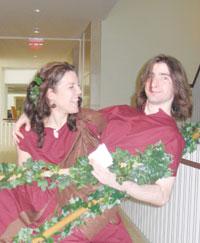One Friday, not too long ago I attended the last of four performances of The Bakkhai by the UMass Boston Classics Club. The performances were held in the Lipke Auditorium in the Science Center.
The average American is apt to overlook the comedy, drama, and perversions that Ancient Greek tragedies play out. Despite what you may read on the internet, the history of Greece was no walk in the park. Sex and violence played major roles in the lives of Ancient Greeks; so sex and violence play a major role in this play, The Bakkhai, by Euripides.
There were three outstanding parts of the Classics Club’s performance: The chorus, the scenery, and the program. The program was a real hidden gem. The story in the program is well written and it includes a Family Tree, which came in very handy during certain scenes. The program also has Greek Translations of the Scenes, and a bio of the author, Euripides, who was born in Salamis, a small island off the shore of Athens. The program uses a very innovative technique of denoting the cast by including a character’s quote. For instance, underneath the title herdsman (Collin Leslie) there is a quote, which the herdsman recites in the play, “What your women are doing in the hills outstrips miracles.”
The story of the Bakkhai revolves around Dionysus, a Greek god of wine and ecstasy, and the circumstances of his birth. Zeus was carrying on with Dionysus mom, Semele, but Zeus’ wife, Hera caught wind of the affair. Hera appeared before Semele and tricked her into summoning Zeus in his godly form – he couldn’t say ‘no’ to her – as a lightning bolt. Semele was killed, but her son, Dionysus was spirited away, sewn up in Zeus’ thigh.
The story begins when Dionysus returns to Thebes, a city north of Athens and the place of Dionysus’ birth, and the home to Semele’s family. Dionysus inspires the women’s animal passions, luring them to wild bacchanals in the hills (The word bacchanal comes from Dionysus’ alias, Bacchus). This incites the jealousy of the king, Pentheus. As anyone can see on reality TV, jealousy is a great plot-mover. Dionysus uses his godly powers to trick Pentheus into dressing up as a Maenad (female follower of Dionysus). This treachery leads to the play’s climax.
The chorus (David Posner, Cat Sauer, and Zulissa Gonzalez) spoke all of their lines as one, harmonious, synchronized group. That is teamwork. The blocking is inventive and well suited to the small stage. Gonzalez, the chorus leader was outstanding, she projected well and kept her character upbeat and fun to watch.
The set and lighting were innovative and interactive. Never have I seen such a simple set accomplish so much. The Crew, Meghan Bernotas and Kristy Hoenigmann did a terrific job. The tomb of Semele lights up (because she was killed by lightning); the columns look good; and the special effects were great when the enraged Dionysus, summons Poseidon to destroy the palace.
Tiresias (Reggie Themistocle) and Kadmos (Sean Robinson) are comical old men who foreshadow the madness to come with their witty banter. Dionysus (Dan Smith) delivers a fantastic performance. Smith’s voice is pliable and he bends it without self-consciousness. Dionysus and Pentheus (Hector Silva-Riobo) have a great repoire, Pentheus is a very comical actor. When he dresses up as a Maenad and sings the line, “Don’t I have great presence when I move. Tell me who I look like, my mother or my aunts?” he brings the house down with laughter.
Cat Sauer acted in the chorus for most of the play, and gracefully switched roles to Agave, Pentheus’ mother for the last scene. The play was well acted, well rehearsed, and ran smoothly. First time student director, Amelia Atwater-Rhodes deserves credit for some truly enjoyable, timeless theater.
The loudest, most awesome performance was David Gerry’s as the Messenger. He delivered some of the greatest, prophetic lines as well, “The best wisdom is knowing what the gods want.”
Robert Bagg’s translation is very apropos to youths today. Ancient Greek drama has more blood and gore than most 21st century theater, and this one has cross-dressing too. Euripides was putting decapitated heads on stakes years before Shakespeare ever thought to.





















































